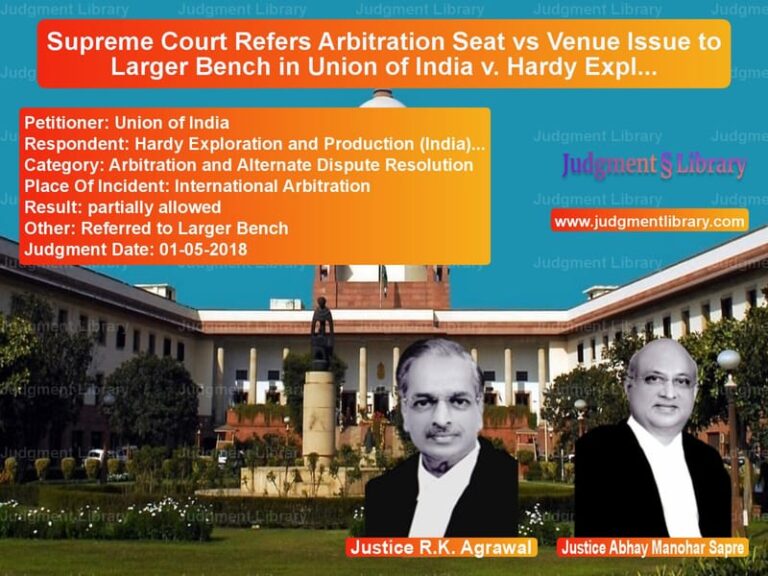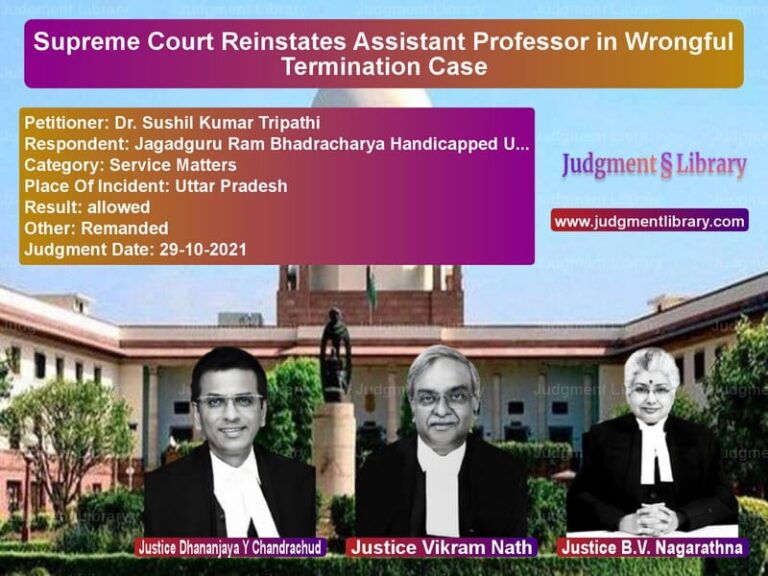Supreme Court Reaffirms Application of Limitation Law in Property Disputes
The case C.S. Ramaswamy v. V.K. Senthil & Ors. revolves around the issue of limitation in property dispute claims under Section 7 Rule 11 of the Civil Procedure Code (CPC). The Supreme Court addressed whether the plaintiffs’ claim was barred by limitation due to the delay in challenging the sale deeds, and whether the legal strategy adopted by the plaintiffs to bring the case within the limitation period was valid.
Background of the Case
The appellant, C.S. Ramaswamy, filed an appeal after the High Court dismissed his civil revision petitions that sought the rejection of the plaints based on limitation. The respondents had filed suits seeking to cancel sale deeds executed in 2005, which they claimed were obtained by fraudulent means. The appellants argued that the suits were filed over 10 years after the sale deeds were executed, making them barred by the law of limitation under Section 7 Rule 11 of the CPC.
The plaintiffs claimed that the sale deeds were obtained by fraud, and they had only discovered the fraudulent nature of the documents in 2015, leading them to file the suits. The key issue before the Court was whether the suits were barred by the limitation period, or whether the plaintiffs were entitled to invoke Section 17 of the Limitation Act due to the discovery of fraud.
Legal Issues
- Was the filing of the suit for cancellation of the sale deeds barred by limitation?
- Did the plaintiffs’ allegations of fraud affect the limitation period under Section 17 of the Limitation Act?
- Should the plaints be rejected under Order VII Rule 11 of the CPC on the grounds that they were barred by limitation?
Arguments by the Appellant (C.S. Ramaswamy)
The appellant argued that:
- The suits were filed more than 10 years after the sale deeds were executed and thus, were clearly barred by the law of limitation.
- The plaintiffs had failed to specifically allege the nature of fraud in their pleadings, which was essential to avoid the limitation period.
- The High Court and the Trial Court had erred in not rejecting the plaints under Section 7 Rule 11 of the CPC, as the plaintiffs’ claims were manifestly vexatious and meritless.
Arguments by the Respondent (V.K. Senthil & Ors.)
The respondents contended that:
- They were unaware of the fraudulent nature of the sale deeds until 2015, when they discovered that the documents had been obtained by fraud and misrepresentation.
- They had filed the suits promptly after discovering the fraud, invoking Section 17 of the Limitation Act, which allows for the extension of the limitation period based on the discovery of fraud.
- The delay in filing the suit was not due to negligence but because they only realized the fraudulent actions of the appellant after visiting the suit property.
Supreme Court’s Observations
The bench, comprising Justice M.R. Shah and Justice Krishna Murari, made the following observations:
1. Fraud and the Limitation Period
The Court observed that fraud, as alleged in this case, had to be clearly demonstrated to extend the limitation period under Section 17 of the Limitation Act. It noted:
“Mere allegations of fraud without detailing the specific acts or the manner in which the fraud was committed do not suffice to invoke Section 17 of the Limitation Act.”
The Court emphasized that the plaintiffs’ vague assertions regarding the fraud were not sufficient to avoid the limitation period.
2. The Importance of Clear Pleadings
The Court held that the allegations in the plaint were vague and did not provide a clear cause of action for the plaintiffs. The judgment stated:
“A mere use of the word ‘fraud’ in the plaint is insufficient. The plaintiffs must plead and prove how the fraud was committed, and the specific actions of the defendant that constitute fraud.”
3. Rejection of the Plaint
The Court ruled that, based on the facts of the case and the lack of specific allegations of fraud, the plaints should have been rejected under Order VII Rule 11 of the CPC. It stated:
“The Trial Court and the High Court should have rejected the plaints as they failed to provide a cause of action and were clearly barred by the limitation period.”
Final Judgment
The Supreme Court allowed the appeals and set aside the High Court’s decision. It ruled that the plaintiffs’ suits were barred by the law of limitation and should be dismissed. The Court also confirmed that the plaints could be rejected under Order VII Rule 11 of the CPC for not disclosing a valid cause of action.
Key Takeaways from the Judgment
1. Clarity in Fraud Allegations
The ruling clarifies that fraud must be specifically pleaded in the plaint, and vague allegations of fraud will not extend the limitation period.
2. Timely Filing of Suits
The Court reinforced the importance of filing suits within the limitation period and emphasized that plaintiffs cannot use clever drafting to circumvent the limitation law.
3. Rejection of Vague Pleadings
The judgment reiterates that the courts must reject plaints at the earliest if they fail to disclose a valid cause of action or if they are barred by law.
Conclusion
The Supreme Court’s decision in C.S. Ramaswamy v. V.K. Senthil & Ors. is an important ruling on limitation laws and the enforcement of contracts. It reinforces the need for clear and specific pleadings, especially in cases involving fraud, and underscores the necessity of adhering to statutory time limits for filing suits. The judgment serves as a valuable reference for litigants and legal practitioners in property disputes, particularly where fraudulent actions are alleged.
Petitioner Name: C.S. Ramaswamy.Respondent Name: V.K. Senthil & Ors..Judgment By: Justice M.R. Shah, Justice Krishna Murari.Place Of Incident: Tamil Nadu.Judgment Date: 30-09-2022.
Don’t miss out on the full details! Download the complete judgment in PDF format below and gain valuable insights instantly!
Download Judgment: c.s.-ramaswamy-vs-v.k.-senthil-&-ors.-supreme-court-of-india-judgment-dated-30-09-2022.pdf
Directly Download Judgment: Directly download this Judgment
See all petitions in Contract Disputes
See all petitions in Property Disputes
See all petitions in Damages and Compensation
See all petitions in Judgment by Mukeshkumar Rasikbhai Shah
See all petitions in Judgment by Krishna Murari
See all petitions in allowed
See all petitions in Quashed
See all petitions in supreme court of India judgments September 2022
See all petitions in 2022 judgments
See all posts in Civil Cases Category
See all allowed petitions in Civil Cases Category
See all Dismissed petitions in Civil Cases Category
See all partially allowed petitions in Civil Cases Category







